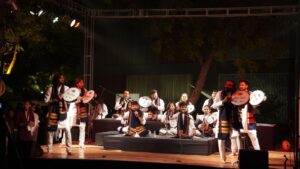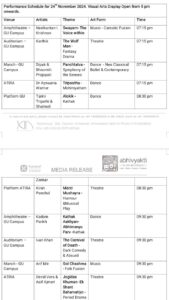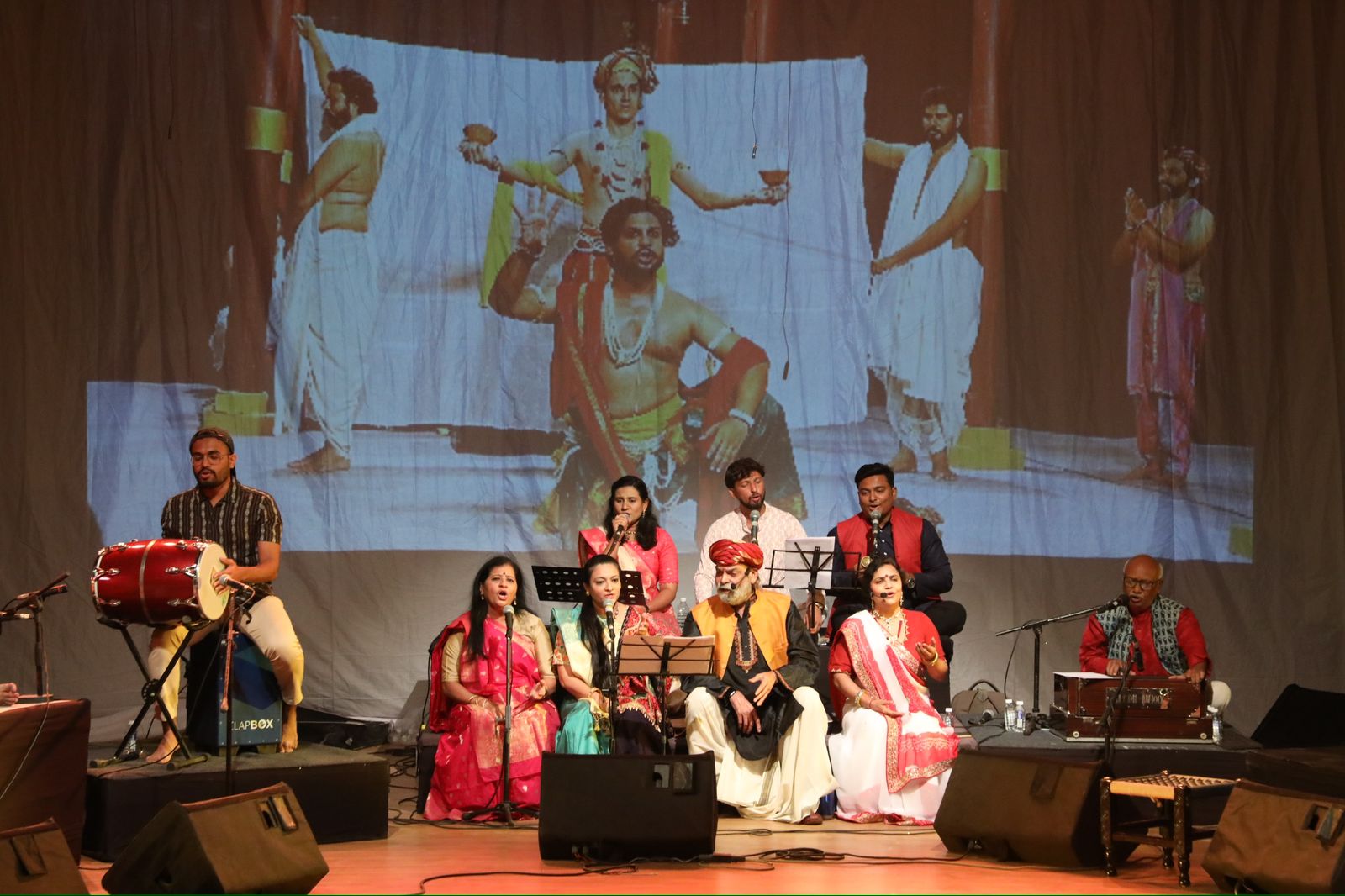Ahmedabad, Nov 23, The sixth Edition of “Abhivyakti – The City Arts Project”, an endeavor of UNM Foundation of Mehta Family’s Torrent Group, witnessed a confluence of contemporary, folk and fusion music with experimental folk theatre on Saturday.
According to The UNM Foundation Jaimil Joshi, who has been part of the previous three editions of Abhivyakti, showcased the versatility of emotions across various borders around the world. His performance titled ‘Borderlands,’ explored the unspoken connections that transcend physical boundaries. While some borders evoke a sense of fear, some evoke the feeling of love and togetherness shared between the people of two countries. Through different genres of music, his act displayed a wide range of human emotions, depicting all the shared lives at borders.
Tushar Sharma brought his theatre production titled ‘99 Days’ – which is a story of three friends living in an apartment. The humour drama showcased how they navigate through their lives by understanding the relationship between a father and a son. The drama talked about the subtle nuances of the importance of a father and how some people aren’t fortunate enough to live with one. A realistic story that brings freshness to an ordinary narrative, the play talked about male friendships, fatherhood and more.
Inspired by timeless tales like Panchatantra and Akbar-Birbal, Smit Bhatt sought to recapture the joy and learning these stories once provided to children and elderly alike. In his act – Thappo – Contemporary Music performance, he showcased how in today’s digital age, where attention spans are dwindling and individuals are caged in the endless scrolling of short videos and posts, how one can seek an escape. The performance highlighted a much-needed break for kids and parents from the constant distractions of screens by featuring songs that reflect everyday life experiences with deeply ingrained cultural values. The act also saw kids in the age-group of 5-12 years performing on the stage, making it more exciting and enjoyable experience for the audience.
Rakesh Wani’s performance of rhythm fusion titled “Anant Lay” is a profound exploration of the interconnectedness between music, life, and the universe. Inspired by his personal experiences and observations, Wani’s production delved into the diverse manifestations of Lay, from the sounds of nature to the rhythms of human activity. By using everyday objects, Wani aimed at creating a unique and immersive musical experience that truly reflected the omnipresence of Lay.
In a different experience for the audience, Ragi Khambhalvi’s folk music performance “Char Bait Gujarati” used words, music, and performances to convey a message of folk art and folk music to the audience. These performances were designed to be accessible to a wide audience, allowing individuals to sing along, connect with the cultural essence, and enjoy the exhilarating dance elements, wherein the primary goal is to introduce and explain the art of “Char Bait Gujarati” to the public.
A street art form of dance was presented by Mansi Modi under the title ‘Funambulism’, which was a captivating tightrope walking by the street dwellers. Her act symbolises that Abhivyakti is as a platform for everyone, whether their art is showcased on the streets or on a grand stage. By incorporating the circus-like element of funambulism, Mansi emphasises the inclusivity of this Arts Project, where all forms of artistic expression are celebrated. Through her performance, she brought together street dwellers who traditionally perform this art form, uniting them in harmony and giving them a platform to shine.
In a gripping musical act, Rajoo Barot’s Traditional Folk music performance ‘Rangbhoomi Na Sadabahar Geeto’ featured a fusion of traditional and contemporary music. The performance included a variety of songs, accompanied by both traditional and Western instruments. Rajoo Barot introduces and preserves this rich theatrical heritage for future generations. The audience gave a resounding applause to the performance for its uniqueness and engaging experience that combined the elements of entertainment with education.
Bhagwat Prajapati a concept that explored duality through the ‘eti-neti’ philosophy under “Dway (A journey of Eti – Neti )” which examined contrasts like emotion, colour, life and death, and reflections. By negating these elements, the performance revealed that all dualities emerge from ‘Shunya’ (emptiness), showing that duality itself is a creation of this fundamental void, inviting a profound reconsideration of reality.
The independent music band – the Mukt Band presented fusion rock with a theme of ‘The Palette Of Time’. It blended alternative rock music with live foley. The production explored the parallel between the changing seasons and human emotions. By incorporating atmospheric soundscapes, they aim to create an immersive experience that brings the seasons to life. The performances featured the talents of Udit Bhavsar, Tarun Gagdekar, and Dhaval Yadav.
An experimental & Modern Folk theatre gave an entertaining closure to the evening. Anannya Vaidya debuted as a director of a full play with her ‘Vahi Kahani, Phir’. A collection of stories of women from all across India, it was inspired by songs and folklore. These are the stories of ordinary women, some that we have been listening to for ages and some we have forgotten. Anannya brought a rendition of her own to them. While bringing her modern storytelling into the play, her concept touches upon feminism along with a commentary on storytelling itself.
Among the Visual Art installations, Jyotik Bhachech presented “The Omnipresent Self” – a photo essay exploring the creative potential of selfies. As a photographer, he captured his reflections and shadows, inviting the audience to see selfies as a form of visual art rather than a compulsive act. The accompanying voiceover shares his personal thoughts, stories, and emotions, inviting the audience to connect with their own experiences and find their own “Abhivyakti” through self-expression.
Chalapaka Chakravarthy presented a captivating installation Portal to Protection that delves into the heart of traditional South Indian culture. The artist believes this installation will resonate with audiences by showcasing the beauty and essence of rural customs. Traditional elements like turmeric, kumkum, rice powder and flowers adorn a door by hanging above the door, reflecting the protective practices seen in village homes. Chakravarthy invites viewers to embark on a journey through these cultural elements, experiencing the power of rituals and objects as talismans against misfortune.
Showcasing a chaotic yet familiar world of a middle-class homes in India, Simran Yagyik’s “This Is Not A Place To Eat” portrayed vibrant depictions of everyday activities. She challenges our perceptions of dining tables and objects. This piece is a poignant exploration of loneliness, insecurity, and the search for order amidst life’s disorder. Simran believes her work will resonate with those who have felt disconnected from their roots, inviting them on a journey of nostalgia and self-reflection.
The audience entry is open-to-all on ‘first come, first served’ basis. The programme schedule for the Pre-event is as follows:

